Red Deer County is inviting beef farmers to talk about a new approach to the industry at the Certified Sustainable Beef Workshop, at Crossroads Church on March 19th.
“It’s a pretty big deal for the beef industry—in some ways, it’s one of the first emerging market opportunities for the beef industry centered around overall sustainability of the product,” said Ken Lewis, conservation coordinator for Red Deer County.
According to Lewis, the Alberta beef industry is one of the most sustainable industries in the province, if not in the world.
“What this is doing is giving the industry the tools to prove it, because the reality of today’s world is we can’t just say we are sustainable,” he said.
The workshop, developed by Verified Beef Production, goes over industry-based organizational tools, protocols and procedures that need to be followed at each step of the production process to qualify beef as Certified Sustainable.
“What’s really neat about this initiative is it’s a way of bringing the product to market that involves the entire value chain from the primary producer right through to the consumer and all the other steps in between,” Lewis said.
The concept of Certified Sustainable Beef is similar to fair-trade or organic food, where belonging to the category conveys to customers that certain measures have been taken throughout the production process.
At this point, Certified Sustainable Beef is not being labeled for customers in this way. Lewis said that this program opens up the potential for that type of labeling to happen in the future, if the industry leads that way.
The categorization is already becoming significant to some buyers like restaurant chains for marketing purpose
Mitch Harty is one of the cattle producers registered to attend the workshop.
The owner of Alberta Dreams Ranch, he keeps about 250-head of cattle and said he is attending the workshop mainly out of curiosity.
“I’m wondering what kind of opportunities are out there to get a little bit of increased value for my product,” Harty said.
A speaker from McDonalds will present at the workshop on what the appeal of Certifiable Sustainable Beef has for consumers.
From Harty’s perspective whether or not the market trend has merit, if there is a demand for Certified Sustainable Beef it’s worth investigating.
“If they want a certain product, we have to shift gears a little bit—the consumer is always right,” he said.
Harty sees this as the direction that things are headed anyways—where farmers are tracking their cattle more closely and documenting their lineage and history in detail.
“There are more and more regulations all the time—when you look at Europe, which is always ahead of us by 10 to 20 years, this is where we’re headed,” he said.
“Basically, I’m hoping that at this meeting, we’ll find out what the criteria is and what they require for sustainable beef.”
A representative from Cargill will talk about The Canadian Beef Sustainability Acceleration Pilot and what they are doing to help producers get involved as quickly as possible.
According to their website, Cargill is an international company committed to feeding the world in a responsible way, reducing environmental impact and improving communities.
“The workshop is about showcasing our industry as a whole, and all the different parts of those value chains that are all working together to produce a product that is sustainable in every way for our consumers,” Lewis said.
There are roughly 800 to 900 beef producers in Red Deer County, according to Lewis.



